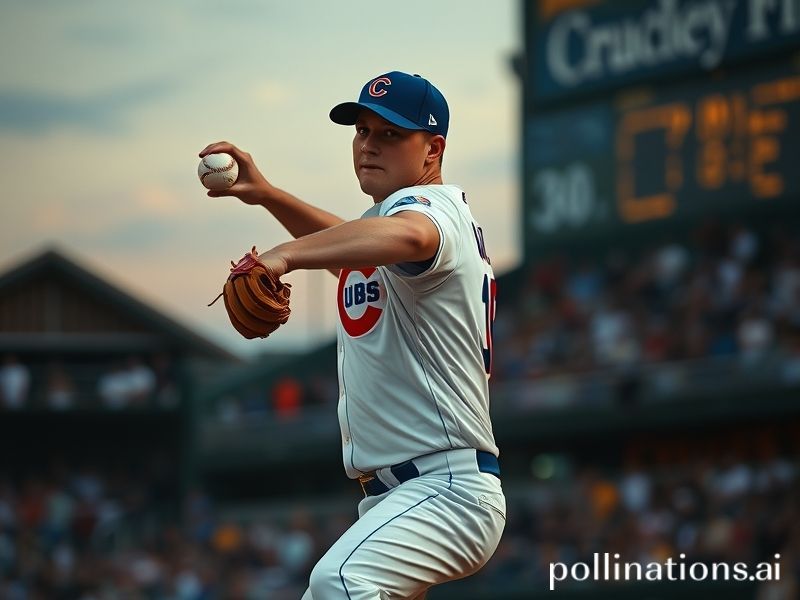Cade Horton: The Global Trade in 95-mph Hope and Other American Myths
Cade Horton and the Quiet Export of American Disillusionment
By “Marcello Vex,” Senior Correspondent, Dave’s Locker Global Desk
If you stroll into a sports bar in São Paulo at 2 a.m. on any given Wednesday, you’ll find financiers in Patagonia vests arguing about the Chicago Cubs’ latest pitching prospect with the same fervor they once reserved for Petrobras scandals. The prospect in question is Cade Horton, a 21-year-old right-hander whose fastball allegedly breaks both bats and childhood dreams in equal measure. Around the mahogany counter, Brazilians who’ve never seen snow now trade scouting reports like samba lyrics, proving once again that the United States’ most reliable export isn’t democracy—it’s narrative, shrink-wrapped and sold at a premium.
Horton’s rise is a tidy parable of late-stage capitalism: a kid from Oklahoma who, in another century, might have been repairing tractors, now monetizes elbow ligaments for a global television audience. The Cubs drafted him seventh overall in 2022, but the more telling number is the $4.45 million signing bonus—roughly the GDP of Tuvalu if Tuvalu were having a slow fiscal year. That bonus has already been securitized, sliced, and traded on three continents, because nothing says “pastime” like derivative instruments.
To the Japanese high-school coach live-streaming Cubs instructional league games at dawn, Horton is a data point proving the universality of velocity. To the London hedge-fund analyst, he’s a hedge against crypto volatility. And to the kid in Lagos streaming pirated MiLB.TV on a cracked Android, he’s the newest American deity—another statue in the museum of dreams built on the bones of shattered local economies. We used to send missionaries; now we send minor-league box scores.
Yet the true international intrigue lies in what Horton hasn’t done. He hasn’t thrown a single regular-season pitch above Double-A, but his jersey outsells most veterans’ in Seoul’s Myeongdong district. MLB’s merchandising arm—basically a money-laundering operation for nostalgia—ships the shirts by airfreight to beat the hype cycle, burning jet fuel at a rate that would make a Saudi oil minister blush. Somewhere in the Arctic, another ice shelf files a formal complaint, but Horton’s curveball gets the headline.
Cynics will note that the Cubs, still without a World Series plan that survives contact with October, are grooming Horton as the next savior precisely because saviors sell tickets. The franchise’s global strategy is equal parts baseball and cosplay: import hope, export disappointment, repeat every 108 years or until the brand guidelines require an update. In the meantime, they’ve opened baseball academies in Mexico, South Africa, and now India, because if you’re going to plunder raw talent you might as well diversify your colonial portfolio.
Meanwhile, European football clubs—those paragons of fiscal restraint—watch from the sidelines with thinly veiled envy. Real Madrid executives, sipping cortados in Valdebebas, quietly ask their data departments whether a two-sport contract might be feasible for a 95-mph arm. The thought of Horton closing out Champions League matches on rest days is absurd, of course, but so was the thought of Americans caring about soccer until Qatar bought the rights and a few more World Cups.
Back in Oklahoma, the town of Norman has erected a modest billboard: “Home of Cade Horton, Future Star.” It’s charming until you realize the billboard is directly opposite a shuttered Walmart, its parking lot colonized by feral prairie dogs who’ve developed a taste for Big League Chew. The juxtaposition is almost too perfect: one kid ascends, the town ossifies, and the world spins on, drunk on the promise that somewhere, someone’s arm is worth more than an entire zip code.
So what does Cade Horton mean to the planet at large? He is the latest proof that globalization has reduced us all to spectators of other people’s potential. While diplomats bicker over grain corridors and carbon targets, the real negotiations happen in bullpens and boardrooms, where a slider’s break angle can shift merchandise revenue from Guangzhou to Geneva. Horton may never win a Cy Young, but he has already won something more enduring: the right to be commodified in seventeen languages, subtitled for cultural nuance, and streamed in 4K even where tap water is still a luxury.
In the end, humanity doesn’t root for athletes; we root for the stories we can sell ourselves. Cade Horton just happens to be the newest chapter, ghost-written by agents, translated by algorithms, and delivered with a side of existential dread. Play ball.







